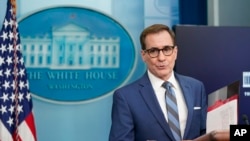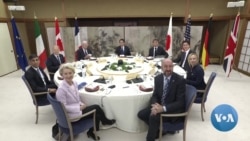The White House continues to push back against the notion that the Group of Seven leaders are concerned about ongoing debt ceiling negotiations that, should they fail, could lead to the U.S. defaulting on its obligations.
From the G-7 summit venue in Hiroshima, Japan, VOA White House Bureau Chief Patsy Widakuswara spoke with John Kirby, National Security Council coordinator for strategic communications, about this and President Joe Biden’s cancellation of the second leg of his Asia trip, which would have taken him to Papua New Guinea and Australia.
This transcript has been edited for clarity and brevity:
VOA: The president is in Hiroshima today amid ongoing debt ceiling negotiations back home. How will he convince G-7 leaders that the U.S. will not default?
John Kirby, National Security Council coordinator for strategic communications: These leaders understand that the president has to take care of the debt ceiling issue. They have economies of their own that they have to manage. And they understand that this is an important priority for the president, and that he's going to have to get back to Washington to make sure that Congress does the right thing here.
These leaders understand how important American leadership is around the world. And they know that that leadership, that credibility, could be hurt if we default, if we become a deadbeat nation. And of course, the president, as you heard him say before he left, he's optimistic, he's confident that we're going to be able to get a deal, that we're going to be able to avoid default. But he also believes it's important for him to physically be home to work directly with Congress on that.
VOA: Following the cancellation of the president's visit to Papua New Guinea and Australia, President Biden immediately called [Australian] Prime Minister [Anthony] Albanese and offered him a state visit. President Biden did not call Prime Minister James Marape of Papua New Guinea until the day after. I understand that Australia is a much closer ally than Papua New Guinea, but considering the fact that [Chinese President] Xi Jinping has been heavily courting Papua New Guinea, has visited the region three times, it would make sense for the president to call Prime Minister Marape immediately. Why didn’t he do that?
Kirby: They had to work through schedules. But look, I mean, he called him the day after, on Air Force One, on the way over here. It was a terrific discussion; the prime minister understood the position that the president was in. And the president extended an invite not only to the prime minister but to other leaders of Pacific Island nations to Washington, D.C., at some point in the future. That'll be the second time that we've hosted Pacific Island leaders in Washington, D.C.; the president's looking forward to that.
And it's entirely possible that a trip back to Papua New Guinea will be on the books and be possible. You can schedule trips and move trips if you need to. What you can't schedule or change or move is this looming deadline date of default. And it's absolutely vital — the president has made this clear — absolutely vital that he has to be home to work with Congress on that.
VOA: The president and other G-7 leaders today begin their day with a visit to the Hiroshima Peace Memorial. This is a backdrop for the issue of nuclear disarmament, which is a big issue for Japan, but also a big issue for the United States. At the same time, extending U.S. nuclear deterrence is also important for the Biden administration. How do you reconcile these two things?
Kirby: The way we have reconciled it throughout so many of the past few decades: It is important that America's strategic deterrent, and the umbrella that that provides to our treaty allies like Japan, like the Republic of Korea, remains in place, remains credible, remains modernized, remains capable. We take those responsibilities very, very seriously. At the same time, the president has throughout his entire public life wanted to see Nuclear Non-Proliferation Treaty and agreements abided by, and to see that we never approach the possibility of a nuclear war, because as he said, it shouldn't be fought and can't be won.
VOA: We are expecting a trilateral summit between the U.S., Japan, and South Korea to happen on the sidelines of the summit. We haven't had confirmation on that. Whether or not that happens, can we expect some kind of extension of the Washington Declaration on extended deterrence that was afforded to South Korea, also afforded to Japan?
Kirby: Well, let's not get ahead of the schedule and the agenda. As you said, I don't have a trilateral discussion to speak to. These are two leaders that President Biden knows very well and has had multiple opportunities to engage with personally, and of course, even over the phone. And he's very grateful to the strong leadership of both Prime Minister [Fumio] Kishida here in Japan and President Yoon [Suk Yeol] in South Korea for the work that they've done to improve their bilateral relations, and to work in a cooperative way on their own defensive capabilities.
Japan has put forward a new national security strategy which really gives them a stronger voice and presence here in the Indo-Pacific in terms of regional security. And President Yoon helped author a new Indo-Pacific strategy that the Republic of Korea put out that dovetails nicely with our national security strategy. So I think whether they get a chance to talk here at the G-7 or not, these are three leaders that know each other well, have had many opportunities to talk about both bilateral and trilateral cooperation, and should a meeting occur, you can expect that the president will take advantage of that to again look for ways to improve and deepen that trilateral cooperation.
VOA: And the language was similar. The language of the readout between President Biden and Prime Minister Kishida was extending deterrence to its full capabilities.
Kirby: That's right.
VOA: And that would include nuclear, just to confirm.
Kirby: Extended deterrence — it does include the potential for nuclear capabilities.
VOA: Administration officials have said that Iran is expanding its military cooperation with Russia. It has provided hundreds of drones to help Moscow in its war in Ukraine. Do you expect that the G-7 leaders will particularly address this issue?
Kirby: They will talk about the full scope of the challenges inside the war in Ukraine. I can't speak specifically about what Iran is doing to support Russia, or what Russia is doing reciprocally to support Iran in the region. But it is not an issue that is alien to — certainly not to us — and not to any of the G-7 leaders. And it's certainly possible that could come up as a part of the discussions that they're going to be having on Ukraine. Let's not lose the big picture here. This is a burgeoning and improving defense relationship that is not only good for the people of Ukraine, who have suffered enough, more than enough. But it's not good for our friends and partners and our neighbors in the Middle East region, as Iran tries to benefit from this relationship with Russia to improve their own military capabilities so that they can sow more discontent and conduct more destabilizing activity in the region. So, we're watching this very, very closely. And you're right. We have called it out publicly. And we'll continue to do so.
VOA: We see that Japan, in its outreach to the Global South, has invited a number of other non-G-7 members. Do you believe that these non-G-7 members will help push or will help reach the goal of a Taiwan contingency, pushing back against Chinese economic coercion, all the goals that the U.S. and the G-7 want?
Kirby: What we hope their participation and attendance will do is inform the discussions that are going on; they have perspectives because of where they live, and what pressures they're under that all the G-7 leaders will appreciate hearing from.
We don't ask countries to choose between the United States and China. I can't speak for the other G-7 nations, but that's not the tack that we're taking. But we do believe that many of these nations — these lower-middle-income nations in particular — are becoming aware, they're realizing that their associations, particularly from a financial perspective with China, are not working out so well for them. And one of the reasons why the G-7 has put in place this PGII — the Partnership for Global Infrastructure and Investment — that President Biden spearheaded at the last G-7 was to provide an alternative source of financing and economic development for these nations so that they don't necessarily have to just turn to China, but it's up to them.






